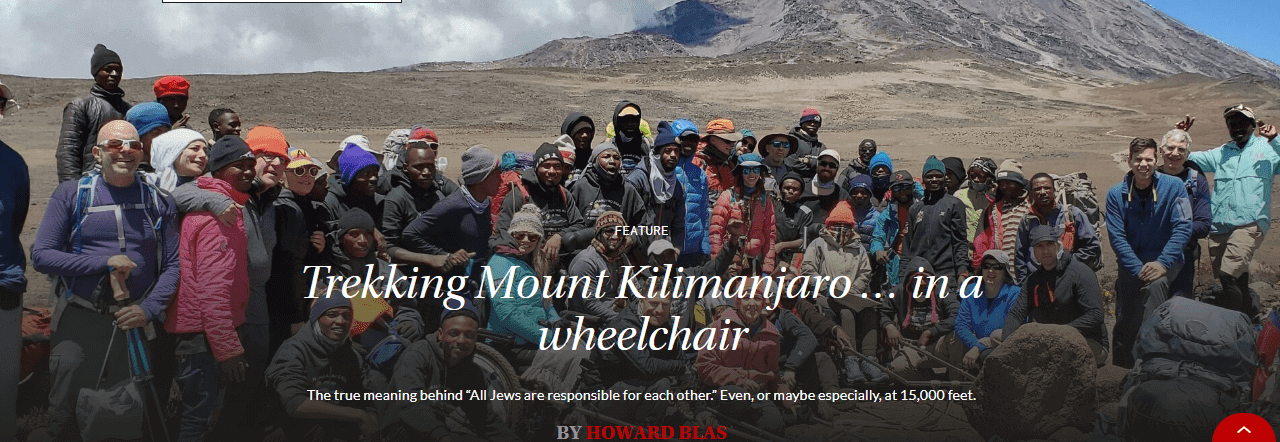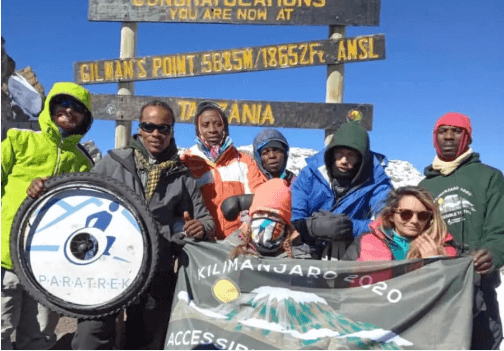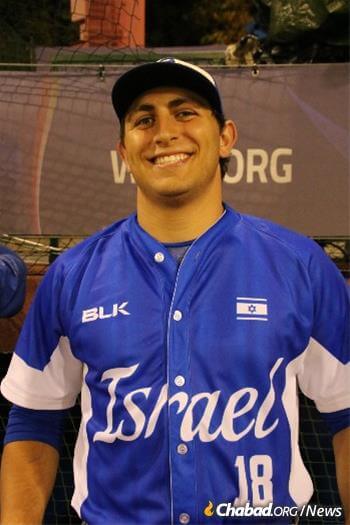The Original Article Published in The Jewish News Syndicate
The true meaning behind “All Jews are responsible for each other.” Even, or maybe especially, at 15,000 feet.
When New York cardiologist, Dr. Aaron Gindea read the entire Torah portion of Beshalach at the Kibo Hut on Mount Kilimanjaro, he may have broken the record for reading from a Torah scroll at the highest recorded altitude—4,700 meters (15420 feet). But Gindea did not come to Tanzania to break any records. He and 25 participants on the Friends of Access Israel (FAISR) Kilimanjaro climb, including four climbers with paraplegia, came to reach Uhuru Peak 5895 meter (19,341 feet) in the name of accessibility and inclusion.
Gindea, his wife Geri, and hikers from Texas, Montana, Pennsylvania, New York, New Jersey and Israel set out to climb the dormant volcano in support of FAISR, an organization that promotes accessibility, inclusion and respect for people of all abilities around the world. FAISR’s collaborative partner, Access Israel, was founded a little more than 20 years ago in Israel and hosts an international conference each year in Israel, in addition to “Dinners of the Senses,” and consults on accessibility and inclusion worldwide.
Daily mileage would range from 3.1 miles on the acclimation days to 13.7 miles during the final midnight-to-sunrise ascent to the summit. The group would spend nights in very basic accommodations, including the Mandara Hut (2,700 meters), Horombo Hut (3,700 meters) and Kibo Hut (4,700 meters). The delegation would be accompanied by three cooks, 21 guides and 70 porters, who carry all participant clothing and sleeping bags, as well as food, water and cooking supplies. Cooks provided kosher meals both at the huts and along the route.
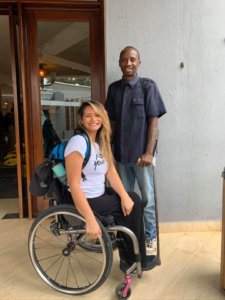
Hikers with physical disabilities who participated in the strenuous, multiday climb included Starla Hilliard-Barnes of Montana, a twice-paralyzed participant; Marcela Maranon, a Peruvian-born woman from Dallas who is both an amputee and has paraplegia, and travels the world alone in her signature “The Journey of a Brave Woman” denim jacket; Arnon Amit, an Israeli man paralyzed in a car accident during his service in the Israel Defense Forces; and Arnold John, a Tanzanian father of three who lives at the base of Kilimanjaro and had always dreamed of making it to the top.
‘A humbling experience’
The hikers with disabilities navigated the mountain with the help of a specially designed off-road, rugged wheelchair known as “The Trekker,” made by Israel’s own Paratrek company. Omer Zur, founder and CEO of Paratrek, designed the chair to enable his father, paralyzed in Israel’s 1973 Yom Kippur War, to enjoy outdoor adventures with peers with and without disabilities. Zur, his colleague Rowee Benbenishty and Israeli Trekker-user Arnon Amit transported five trekkers, tools and replacement parts from Israel to Tanzania. Zur and his team maintained the Trekkers throughout the journey and trained the Tanzanian porters—six per Trekker—in proper pulling, guiding and pushing procedures.
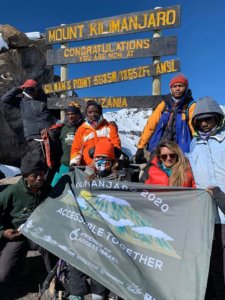
Participants without disabilities divided into teams—Team Marcela, Team Starla, Team Arnon and Team Arnold—and hiked together through five climatic zones and often rough terrain. David Icikson, president of Congregation Orach Chaim on New York City’s Upper East Side, had the additional responsibility of transporting a carefully wrapped Torah scroll in his day pack. Eleven members of the synagogue, including FAISR’s executive director and trip organizer, James Lassner, participated in the expedition. The group made good use of the scroll, reading it at morning minyans on Monday and Thursday mornings, as well as on Shabbat.
Despite the very real need for sleep following each strenuous day of hiking, group members were committed to getting up early for daily minyan as one participant was saying mourners Kaddish. Even the secular Israeli Paratrek mechanics—busy each day maintaining the special chairs—and Arnon, the Israeli climb participant, joined in the prayer session. Gindea remarked: “Sharing this unique experience with this special group made the davening itself remarkable. Having Omer, Rowee and Arnon (the three Israelis in the group) participate in the minyan (and help make the minyan) reinforced to me that Kol Yisrael areivim (“All Jews are responsible for each other”), even at 15,000 feet!”
On Friday evening, with four tough days of hiking complete, group members gathered in the mess hall for Kabbalat Shabbat services and dinner—complete with grape juice and challah from New York—carried in a backpack all week long. On the cold Shabbat morning, group members assembled in a dorm room with a wooden table and two sets of bunk beds. The Torah was carried down 10 steep stairs so that Arnon could have an aliyah from his wheelchair. Manhattan pediatrician Dr. Barry Stein recited the Haftarah portion on the 50th anniversary of his bar mitzvah, which he had celebrated in his native South Africa.
At lunch, Joseph Grunfeld (known affectionately to the group as “Joey G”), who experienced a traumatic knee injury to both knees three years ago, delivered a d’var Torah about crossing seas and climbing mountains. Gindea was moved. “As Joey G pointed out, B’nai Yisrael had to cross the barrier of the Red Sea before reaching Mount Sinai.” Gindea, still reflecting on the experience of celebrating Shabbat and reading Torah on the mountain, continues, “To be privileged to read about the crossing of the Red Sea and realizing that after Shabbat, beginning the week of Yitro, we would be climbing our own mountain was a humbling experience.”
‘How blessed we are with all we have’
At 11:30 pm. on Saturday night, with head lamps and layers of warm clothing, the group set out for the final all-night ascent. Thankfully, each participant—with and without disabilities—reached one of the three summits—Stella’s Point (5,756 meters), Gilman’s Point (5,685 meters) or Uhuru Peak (5,995 meters).
Josiah Baer and wife Emily, friends of Starla Hilliard Barnes and Shannon Barnes—all from Kalispell, Montana—were glad they had the opportunity to participate. “We all developed in to a family on this trip!” Josiah reports. “I learned about thankfulness and how blessed we are with all we have.” And he praised the porters. “They work so hard—and they never complain!”

Josiah found the four participants with disabilities on the trip to be “super brave” as they put their trust in others who assisted them up the mountain. Ari Storch of Manhattan was impressed with how the group consistently “came together as a community” and “didn’t care about egos,” even when the group faced challenges. Arnold John, the local Tanzanian climber who always s dreamed of climbing Kilimanjaro, was very emotional, declaring, “I am very happy to climb this mountain. I prayed to God to bless me, and he answered my prayers!”
The group returned to their hotel in nearby Moshi for much-needed showers and the first opportunity in more than a week to check email and to call family members. Following a celebratory dinner, most delegation members opted to participate in a two-day safari, seeing baboons, rhinos, giraffes, elephants, zebras, flamingos, ostriches, gazelles and lions in the Tarangire National Park and the Ngorongoro Conservation Area.
The final day in Tanzania began with a rare opportunity to meet and pray with the small Arusha Jewish community, descendants of Yemenite and Moroccan Jews who came to eastern Africa in the 1880s. Yehuda Amir Kahalani, a local lawyer and college professor, is head of the community, which recently received its first Torah scroll, a donation from a synagogue in Ottawa, Canada. The group next enjoyed the opportunity to visit Shanga Village, a vocational training program for people with disabilities, and to purchase hand-crafted souvenirs at Shanga, the Arusha Cultural Heritage Center, and at the Maasai Market before flying to their respective homes.

David Icikson returned the well-traveled Torah to its home at Orach Chaim Congregation in Manhattan. The synagogue’s spiritual leader, Rabbi Ben Skydell, greeted him. “We are extremely proud that so many members of our community participated in this amazing climb. Both through their raising awareness of the technologies for inclusion that are being produced in the State of Israel, and in convening the highest-altitude minyan/Torah reading in history, these climbers embodied the deepest teaching of our tradition—that the Torah is for everybody, everywhere.”
Lassner was similarly proud of his fellow congregants and all of the climbers. “This definitely wasn’t a week of ‘I.’ The biggest thrust in this exceptionally difficult feat is that all came with the attitude that ‘we’ are our sisters and brothers’ keepers!”
As a journalist who focuses on Jewish disability inclusion, I was privileged to attend the Access Israel conference last May, where I learned more about accessibility, inclusion and technology from, and along with, 800 participants from 22 countries. I also discovered that James Lassner, from my New York City community, had co-founded FAISR, Friends of Access Israel, and that a group was planning its first-ever climb on Mount Kilimanjaro. It took place from Feb. 4-10 (with me in along for the ride).
